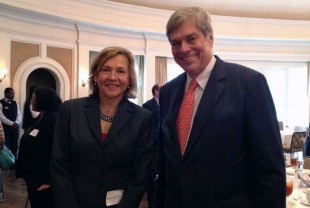Photonics pioneer recognized at annual ‘Celebrating Women in Science’ luncheon
Naomi Halas, the Stanley C. Moore Professor in Electrical and Computer Engineering and professor of chemistry, biomedical engineering and physics and astronomy, was honored at BioHouston’s fifth annual “Celebrating Women in Science” luncheon Oct. 30 at the River Oaks Country Club.
Halas is one of the world’s most-cited experts in plasmonics and nanophotonics. In his introduction of Halas at the luncheon, former Rice President Malcolm Gillis said Halas “brought a different perspective” when she joined Rice’s faculty in 1990 “because she had mastered two different scientific disciplines — chemistry and physics. Not only was she able to think like a scientist, looking for answers to questions of ‘Why,’ she could also think like an engineer and focus on the question of ‘What is this for?”

Naomi Halas and Rice Provost George McLendon at BioHouston's annual "Celebrating Women in Science" luncheon Oct. 30.
In her acceptance speech, Halas thanked her students and colleagues at Rice, and she lauded BioHouston’s leading role in fostering technology transfer and regional economic development.
“I also want to acknowledge the exceptional and unique atmosphere at Rice University,” she said. “When I came to Rice from Bell Labs, I noticed a tremendous similarity, partially because Rick Smalley had a great charisma and a great attitude toward science and toward connecting people with one another. I realized that this was an extraordinary atmosphere where one could ask fundamental questions and, at the same time, look for the value in establishing new applications and new technologies.”
Halas, who also directs Rice’s Laboratory for Nanophotonics (LANP) and the Rice Quantum Institute, specializes in studying how light interacts with engineered nanoparticles. Her research spans a broad spectrum from optics and electromagnetic theory to chemical nanofabrication. LANP has created and characterized dozens of new varieties of nanoparticles that are engineered to interact with light in specific ways, often to perform a function in unique applications that have societal and technological impact.
One of Halas’ inventions, gold nanoshells, is the subject of ongoing clinical trials for the treatment of both lung cancer and head and neck cancer. In the treatment, nanoparticles encased in a thin shell of gold are injected and absorbed by tumors. An invisible, tissue-penetrating laser is then used to heat the particles and destroy the tumor with very little damage to nearby healthy tissue.
Halas’ research group also is studying energy applications for light-activated nanoparticles. In 2012, she unveiled a revolutionary new technology for converting solar energy directly into steam. Halas is working to develop the technology for sanitation and water-purification applications in the developing world.
Halas was elected to the National Academy of Sciences in April, and she and longtime collaborator Peter Nordlander were this month awarded the American Physical Society’s (APS) Frank Isakson Prize for Optical Effects in Solids. Halas is a member of the American Academy of Arts and Sciences, and she is a fellow of the American Association for the Advancement of Science, the Materials Research Society, the Optical Society, APS, the International Society for Optical Engineering and the Institute for Electrical and Electronics Engineers.
Previous BioHouston honorees from Rice include Lydia Kavraki, Rice’s Noah Harding Professor of Computer Science and Bioengineering; Rebecca Richards-Kortum, the Stanley C. Moore Professor of Bioengineering and department chair; Kathleen Matthews, the Stewart Memorial Professor of Biochemistry and Cell Biology; and Jennifer West, former professor and chair of the Department of Bioengineering.
Other 2013 honorees were Annell Bay of Marathon Oil Company, Janet Butel of Baylor College of Medicine and Guillermina “Gigi” Lozano of the University of Texas MD Anderson Cancer Center.
BioHouston, a nonprofit organization founded in 2001, is dedicated to making the Houston region a world-class competitor in the life-sciences industry.


Leave a Reply